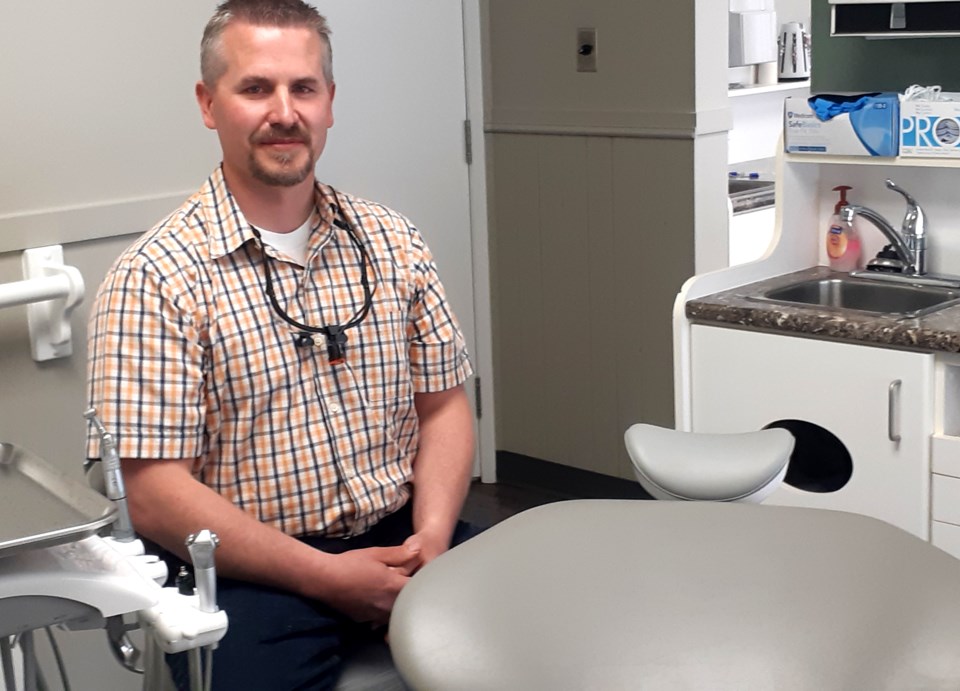After more than two months of keeping his drills, scalers and probes parked in their chairside racks with his other dental instruments, Terah Albertson will have the tools of his trade back in his hands next week.
Albertson and his staff at Timber Ridge Dental in Tabor Plaza will resume helping patients relieve their toothaches and polish their smiles for the first time since March 16, when the province, in response to the pandemic, put the clamp on non-essential medical services.
On Wednesday the office doors will reopen for a backlog of patients who require more urgent care and that day can’t come soon enough for Albertson. He’s used his time away from his profession to tackle some home renovations at the Mud River home he shares with his wife and five children and that’s kept his mind occupied, knowing he hasn’t been able to do what he’s trained for since he began practicing dentistry in 2012.
As one of the dentists who make themselves available on-call one day or weekend per month for Prince George dental emergency services, Albertson knows some patients have suffered as a result of COVID-19 restrictions which kept most dental offices closed.
“I feel bad for patients who have dental emergencies and are not receiving ideal treatment,” said Albertson. “For someone with an infection, usually you’d want to prescribe them an antibiotic, control the infection and then remove the source of infection.
“In some situations they’re being treated with prescriptions, where some type of definitive treatment in the dental chair would be more ideal. Those patients have been asked to stay away from the office if possible, which isn’t ideal. When you’re trying to exercise social distancing and limit contact between people, that’s what was recommended.”
Fortunately for those pain-sufferers, dentists were given the go-ahead to return to work nearly two weeks ago when the province enacted Phase 2 of the BC Restart Plan. The College of Dental Surgeons of BC has urged that all elective and non-essential dental services be suspended until the threat of the virus spreading diminishes but dentists can resume treating patients with urgent needs. Cleanings and other less urgent procedures are also allowed under the new provincial order, left up to the discretion of each dentist.
“If someone had (gum disease) symptoms, because of gingivitis or periodontitis, that might be a situation where we’d consider doing a cleaning,” Albertson said. “But if it’s a healthy 20-year-old just having no symptoms, we’d say let’s wait until things are more safe.”
Phase 2 kicked in May 19 but the college did not issue updated guidelines until a few days before that. Like many dentists, Albertson decided to delay opening his office again by a couple weeks to allow him to gather personal protective equipment and prepare his staff for the new requirements.
Plexiglas screens have been installed in the reception area and some of the chairs where patients sit in the waiting area have been removed, as have toys and books for kids, which could transmit the virus. Basic masks and surgical gloves are to be used on all patients. Unless a patient is deemed high-risk to be infected with COVID-19, Albertson won’t have dip into his precious supply of N95 medical-grade masks, gowns or face shields.
“That’s been one of the challenges and one of the reasons we’re not open yet, to track down some PPE,” said Albertson. “There are some items – N95 masks and surgical gowns - I ordered two months ago and I had to find a different source because the first source hasn’t delivered it yet.”
Whenever possible, physical distancing measures must be followed. Staff are instructed to disinfect doors, pens, surfaces and washrooms after contact with each patient. The province also recommends that dentists have the heating, ventilation, air conditioning (HVAC) air filtration system of their office evaluated as an added precaution.
“A lot of offices are having patients wait in the car and they are called once the previous patient has left, so there’s no overlap of patients in the office,” Albertson said. “They haven’t given a lot of specifics, more guidelines because each office will have a unique situation as far as the layout and the space they have available.”
Before they arrive in the office for an appointment, patients are pre-screened over the phone and are asked a series of questions from a list compiled by the BC Dental Association to determine if they have any COVID-19 symptoms.
“The big push from our overseeing body is in the triaging and making sure we’re not having patients with a risk of having COVID-19 coming to the office,” said Albertson. “They’ve left that up to the practitioners’ professional judgement.”
At 38, Albertson is not in the high-risk age category if he becomes COVID-19-positive. He says neither he nor his staff are afraid about going back to work.
“Some of my staff do have family members that are elderly and the concern is passing it on to them, but it does bring some piece of mind knowing we’ve taken the precautions we’ve been asked to,” said Albertson.
“Overall, patients have been understanding and cooperative with the situation and hopefully we can get back to meeting their needs more fully in the future here.”



.png;w=120;h=80;mode=crop)